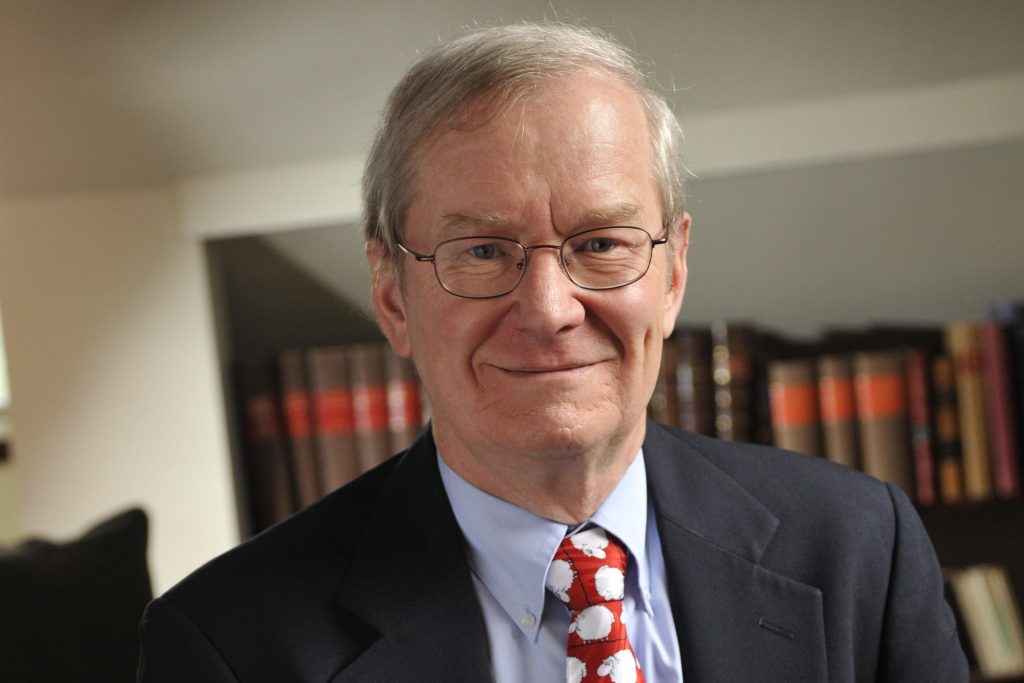James Rogers, who joined BC Law as a professor in 1980 and served as interim dean of the Law School during a long and distinguished career, will be retiring this spring after 36 years of service.
“Jim Rogers has played such a vital role at this law school over the years,” said BC Law Dean Vincent Rougeau. “Scholar, teacher, leader, historian, friend…it is difficult to fully state how much he has meant to us, and what he has meant to the commercial law field. We are all grateful for his immense contributions, and wish him well during this next chapter in his life.”
An internationally known expert in commercial law and payment systems, Rogers played a major role in the development of modern commercial law. He served as Reporter for the Drafting Committee to Revise UCC Article 8, which established a new legal framework for the modern system of electronic, book-entry securities holdings through central depositories and other intermediaries. Rogers has spoken on that project at numerous symposia and conferences both in the United States and abroad. He was also involved in the projects on negotiable instruments (UCC Articles 3 and 4) and secured transactions (UCC Article 9).
Rogers’ scholarship includes dozens of highly cited journal articles, and his book The Early History of Bills and Notes (Cambridge University Press) is widely regarded as one of the most important scholarly works on the rise of English commercial law. His book The End of Negotiable Instruments: Bringing Payment Systems Law Out of the Past (Oxford University Press) firmly established his reputation as “the foremost historian of commercial law in the world,” according to Monan Professor and former BC Law Dean Daniel Coquillette.
Coquillette said at a recent reception honoring Rogers that “during [Rogers time as dean] he not only ran the school with skill and compassion, but made major developmental gains, such as assisting in bringing a chair to the school. We owe [Jim] a great debt.”
Founders Professor Mary Bilder, a close colleague, said students loved Rogers’ classes. She shared some of their recollections on how he taught them to be precise in their language and understand the problems of ambiguity: “They recounted in an enormous detail (including sending photographs) of Jim’s teaching the Frigaliment case in which the issue involved the meaning of “chicken”—Jim showed photos of roasted chickens, live chickens, brought in several different stuffed animal chickens and even wore his chicken tie. He turned a topic expected to be dull into something entertaining and relevant.”
Bilder, a co-convener with Rogers of the BC Law Legal History Roundtable, also lauded his scholarly contributions, and said that he brought these same convictions to teaching. “He was always prepared—and continually modernizing his class to keep up with new generations of students,” she said. “He was not happy with traditional contracts materials and so created his own. [BC Law Professor] Katie Young and he are publishing the materials as a casebook with Foundation Press. She notes that they are a pleasure to read and teach with—Jim chose the best stories, often classic cases, to demonstrate precision in language and common law legal argument and reasoning.”
“Jim’s hard-work and precision has been essential to the operation of the law school over the last three and a half decades,” Bilder said. “My remarks today are made with delight and sadness. Delight for Jim that he has reached this date of retirement in precisely the careful manner that he planned several years ago – and sadness for the law school, and particularly for me, in saying farewell to such an esteemed and wonderful colleague.”
Rogers was a graduate of the University of Pennsylvania and Harvard Law School. He received the Fay diploma from Harvard, given to the highest GPA in the class, a rare honor. Rogers clerked for Bailey Aldrich on the First Circuit Court of Appeals, and then worked for several years at the law firm Sullivan and Worcester before joining the BC Law faculty.
Read Professor Mary Bilder’s remarks
Read Professor Daniel Coquillette’s remarks


